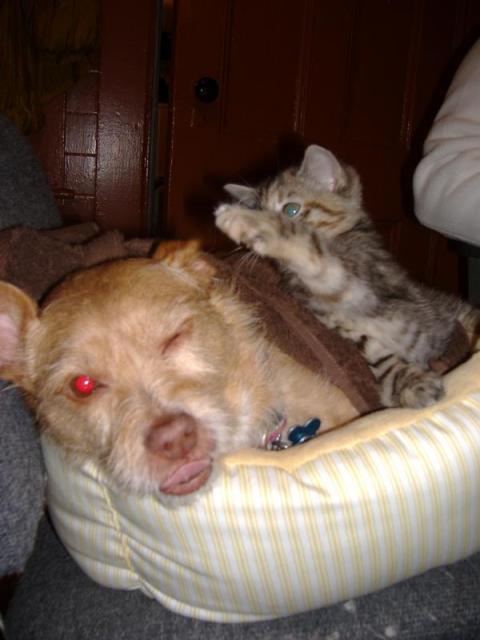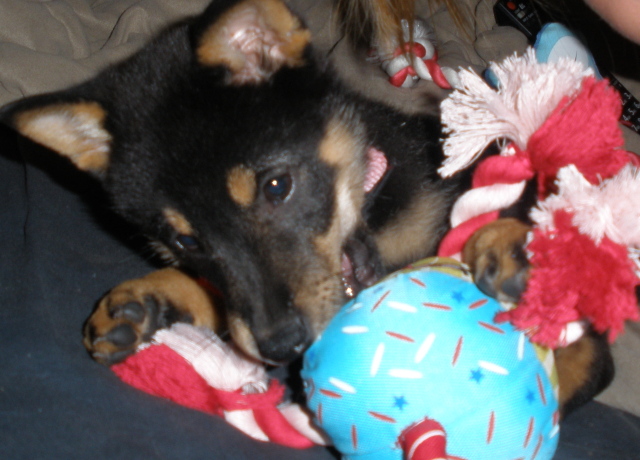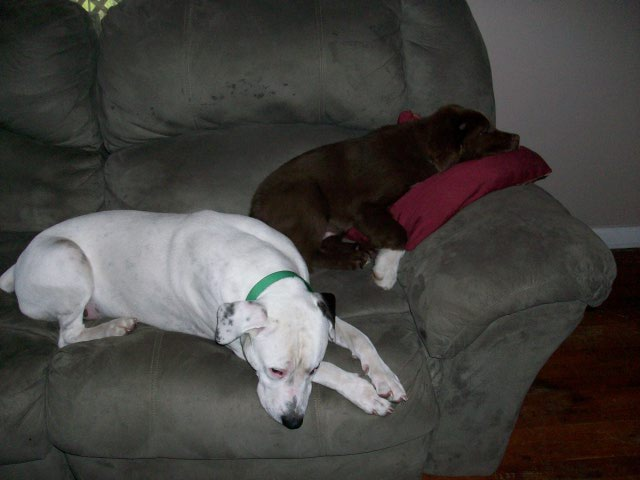QuestionWondering if you have any insight on behavior among littermates when one of the littermates passes away after almost 12 years of being together. 1 of our female Brittany's passed away last week. The other 2 female littermates are definately missing her. We try to keep them upbeat and not show our own grief around them, but at times it is apparent they are very down and are wondering where their sibling is. We never let them dominate one another and they have excellent temperment, but if I had to describe the situation, the two dogs that we have now are the somewhat-alpha dog (doesn't eat or drink first or anything like that - that behavior was equal among the 3 but this dog would be the most aggressive of the 3) and the other dog is the very playful one. She is still playful but seems to miss her favorite playmate. It seems the dog we had to put to sleep (diabetes and kidney problems suddenly occurred - bloodwork was perfect 5 weeks prior) held the 3 together. I think the 2 dogs we have will just become closer friends, but currently we have a dominate dog with no one to dominate and a playful dog missing her playmate. The 3 got along very well but just seemed each of the 2 we have now were closer to the one we lost. Do you have access to any research on this? Is there anything we can do to make sure they don't suffer too much due to the loss of their sibling? We are afraid this will affect them to the point we may lose them to so want to make sure that does not occur.
Answer Dear Coleen,
Thanks for writing. Sorry to hear of your loss.
"Do you have access to any research on this? Is there anything we can do to make sure they don't suffer too much due to the loss of their sibling? We are afraid this will affect them to the point we may lose them to so want to make sure that does not occur."
Anytime you add or subtract a pet or person from a household the dynamics between animals (and humans) changes. I am not aware of any research on how the loss of one litter mate or pet affects the remaining animals. I do believe that like humans, animals miss the company of their usual house mates. I've met dogs who seem to grieve over such a loss. They appear apathetic and are not their "usual selves".
I would try to keep them engaged with lots of exercise and play. Over time, they will stop looking for her.
Sorry, I'm not sure what you mean by "affect them to the point that we may lose them".
I wish you the best during this sad time. Thanks for writing.
Alan J Turner
http://howsbentley.com
Thanks for your response - "affect them to the point that we may lose them". I'm wondering if they will be so saddened that they may start to become ill. I can't take losing another and with them all the same age it is a bit scary. The two that remain are healthy with good blood tests, but their littermate also was healthy just 5 weeks prior to her passing. Do you recommend frequent blood tests on dogs when they reach a certain age to be alerted to any problems? Is there any detrimental affect drawing blood once a month?
AnswerI don't understand what the remainder of your question is other than an answer you received from someone else.
You are anthropomorphizing the response your dogs are demonstrating. When any member of a dog pack (including a human member) is no longer present, the remaining dogs will become depressed (or appear to be.) This is the normal emotional adjustment to the 'missing link' and it can take several weeks for it to resolve. What happens next is up to you. You need to fill the gap created by the more dominant dog by taking psychological control over the remaining two so that neither one becomes suddenly more assertive toward the other. Pack leadership is accomplished with a fair and consistent approach; both dogs should be emotionally stabilized by your slowly, but surely, demanding some things of both of them at once, while they are together. Ask each dog for a simple obedience behavior before feeding them, letting them out or in, giving treats or toys. Give your attention FIRST to the dog you perceive is the more dominant, thereby cementing that new rank, but consistently demand simple obedience behaviors (like 'sit') as described above. You will effectively be promoting yourself over them both and that will make for a calmer, more secure household; your dogs will thank you for it.
As for blood tests, I have lost several dogs due to lymphoma and other cancer after an almost normal blood test. Of course, this also depends on the skill of the diagnosing veterinarian and the quality of the lab the blood work is sent to, as well as the sort of blood work done. But even super chemistry doesn't seem to diagnose certain cancer. You describe kidney problems as having suddenly appeared and this concerns me. Unless a household agent or something the dog inadvertently drank or ate is involved, animals (as well as people) do not just suddenly develop renal failure. I suggest you find another veterinarian and have another super blood chemistry on both remaining dogs. I understand your grief and fear of losing the remaining two, I have experienced this sort of anxiety myself. But no one has any guaranty of life; enjoy them now, love them now, provide them with the most emotionally secure environment you can and keep their relationship intact.

 My dog is shaking and hiding under my bed recently
QuestionRorrie and Pencil
QUESTION: My dog, Rorr
My dog is shaking and hiding under my bed recently
QuestionRorrie and Pencil
QUESTION: My dog, Rorr
 Companion for Lonley Westie
Question
Shannon
We have a 5-year-old neutered Westie w
Companion for Lonley Westie
Question
Shannon
We have a 5-year-old neutered Westie w
 My Shiba Inu
Question
Lola
I bought a registered Shiba Inu puppy fro
My Shiba Inu
Question
Lola
I bought a registered Shiba Inu puppy fro
 aggression in aging dog
Question
Niko
I have a thirteen year old, female, Samoy
aggression in aging dog
Question
Niko
I have a thirteen year old, female, Samoy
 American Bulldog aggression
Question
Buddy and Rez
I have a 2 year old Ameri
American Bulldog aggression
Question
Buddy and Rez
I have a 2 year old Ameri